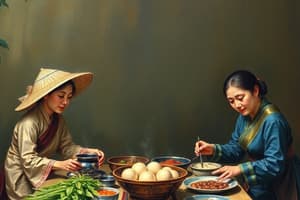Podcast
Questions and Answers
In a traditional Vietnamese family, what is the typical authority structure?
In a traditional Vietnamese family, what is the typical authority structure?
Patriarchal, with the eldest male holding the most authority and respect
What is the significance of having many children in Vietnamese culture?
What is the significance of having many children in Vietnamese culture?
To ensure family lineage and support in old age
What value is taught to children in Vietnamese culture regarding their elders?
What value is taught to children in Vietnamese culture regarding their elders?
Respect and care for their parents and grandparents
What is the expectation for children in old age regarding their parents?
What is the expectation for children in old age regarding their parents?
What is the traditional role of women in Vietnamese families?
What is the traditional role of women in Vietnamese families?
What type of intergenerational relationships exist between siblings and cousins?
What type of intergenerational relationships exist between siblings and cousins?
What is one of the importance of intergenerational relationships?
What is one of the importance of intergenerational relationships?
What is the role of a parent in a family?
What is the role of a parent in a family?
What is an example of a responsibility that shifts across the lifespan?
What is an example of a responsibility that shifts across the lifespan?
What type of responsibility involves assisting with daily tasks and household chores?
What type of responsibility involves assisting with daily tasks and household chores?
Flashcards
Vietnamese family authority.
Vietnamese family authority.
Patriarchal, with the eldest male holding the most authority and respect.
Significance of many children.
Significance of many children.
To ensure family lineage and support in old age.
Value taught to children.
Value taught to children.
Respect and care for their parents and grandparents.
Children's expectation in old age.
Children's expectation in old age.
Signup and view all the flashcards
Traditional role of women.
Traditional role of women.
Signup and view all the flashcards
Importance of intergenerational relationships.
Importance of intergenerational relationships.
Signup and view all the flashcards
Role of a parent.
Role of a parent.
Signup and view all the flashcards
Responsibility shift across lifespan.
Responsibility shift across lifespan.
Signup and view all the flashcards
Instrumental responsibility.
Instrumental responsibility.
Signup and view all the flashcards
Study Notes
Gia Đình: Family in Vietnamese Culture
Family Structure
- Extended family: Gia đình often includes three to four generations living together or nearby
- Patriarchal: The eldest male typically holds the most authority and respect
- Large families: Many children are desired, especially sons, to ensure family lineage and support in old age
Family Relationships
- Respect for elders: Children are taught to respect and care for their parents and grandparents
- Filial piety: Children are expected to support and care for their parents in old age as a sign of gratitude
- Close-knit relationships: Family members often prioritize family harmony and unity over individual interests
- Role of women: Traditionally, women are expected to prioritize family and childcare responsibilities over personal careers and goals
- Sibling relationships: Siblings are often close, with older siblings taking on mentorship roles for younger ones
Studying That Suits You
Use AI to generate personalized quizzes and flashcards to suit your learning preferences.




